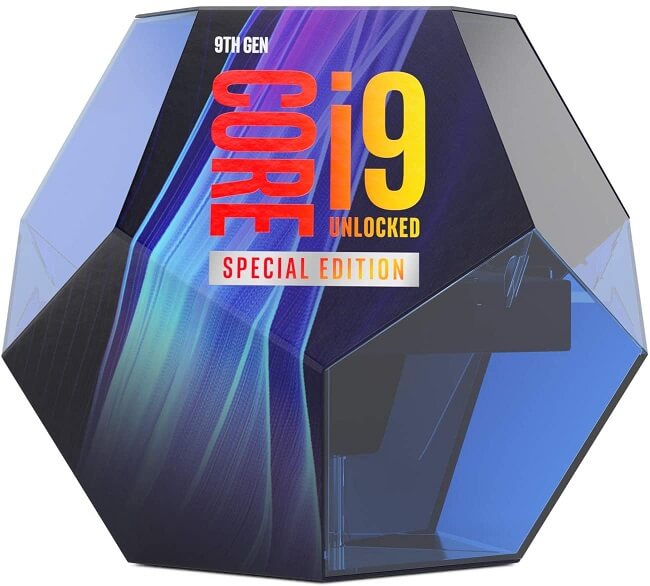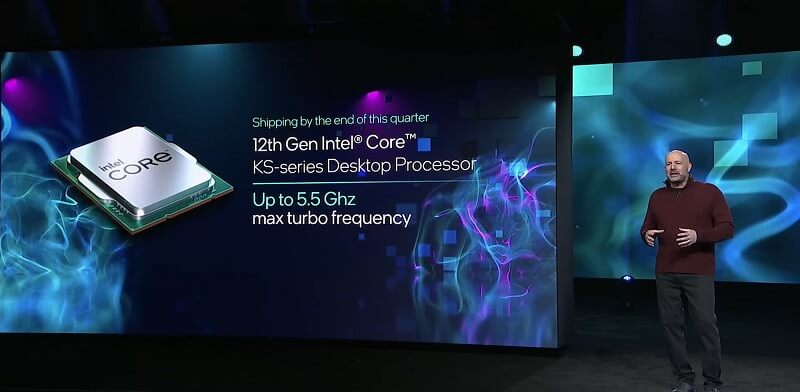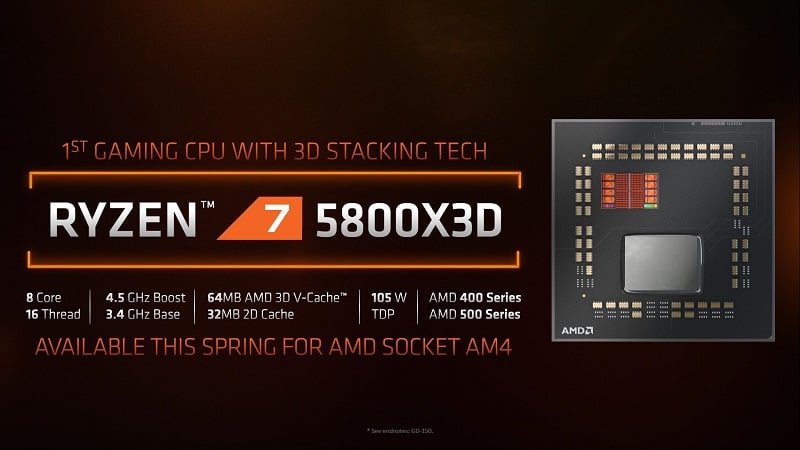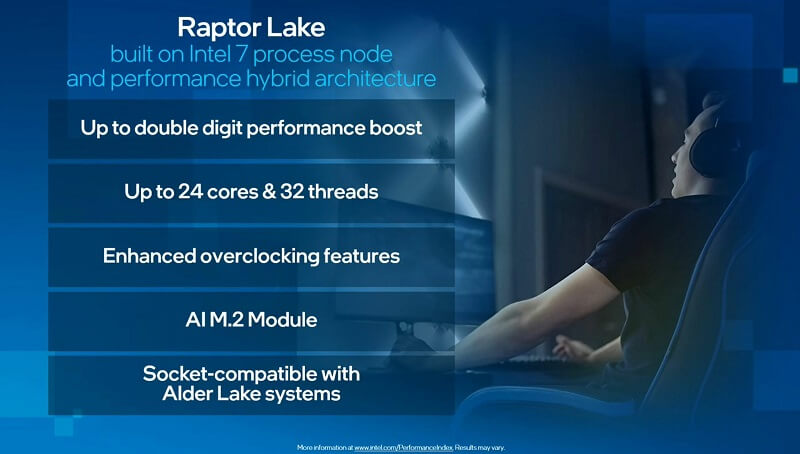Intel is soon set to launch a new flagship processor with a specialist slant. The Core i9-12900KS will likely be the fastest gaming processor ever made, but it will demand a lot to do it, and will likely only be available in limited numbers. It requires pretty specialist silicon to break the 5.5GHz barrier, after all.
It faces stiff competition when it does debut, though, not only from Intel’s existing lineup of stellar 12th generation Alder Lake processors, but AMD’s existing and soon-to-be enhanced Zen 3 lineup of CPUs. There’s also the looming potential of an entirely new generation of processors from both red and blue teams just over the horizon.
So, how long any early-2022 CPU gaming king awards can last, remains to be seen.
But none of that takes away from the excitement of a new bleeding-edge design from Intel which sees it push its processors to the absolute limit just to say that it got there first.
The Core i9-12900KS: King of Kings

Intel’s current 12th generation processors are, without a doubt, the best gaming processors on the market in early 2022.
They have the highest clock speeds, the highest per-core performance, and with the added efficiency cores of the top-tier chips, the best multi-threaded performance too. That competition has finally forced price drops on AMD’s still-excellent Ryzen 5000 series CPUs, and an announcement of upcoming budget Zen 3 CPUs that makes AMD’s lineup more competitive than ever.
It’s an exciting time to buy or build a new gaming PC, with heaps of options available for all sorts of components. But it’s especially exciting considering what’s coming down the pipeline. The Core i9-12900KS will be a unique CPU, in a similar vein to the Core i9-9900KS when it launched just a few years ago.
| Core i9-12900KS | Core i9-12900K | Core i7-12700K | Core i5-12600K | |
|---|---|---|---|---|
| Cores | 16 (8P+8E) | 16 (8P+8E) | 12 (8P+4E) | 10 (6P+4E) |
| Threads | 24 | 24 | 20 | 16 |
| Base Clock | 3.4GHz | 3.2GHz | 3.6GHz | 3.7GHz |
| Single Core Boost Clock: | 5.5GHz | 5.3GHz | 5.0GHz | 4.9GHz |
| All Core Boost Clock: | 5.2GHz | 5GHz | 4.7GHz | 4.5GHz |
| TDP (PL1) | 150W | 125W | 125W | 125W |
| TDP (PL2) | 260W | 241W | 190W | 150W |
The i9-12900KS Best Bits
The Intel 12900KS is a specially binned and overclocked Core i9-12900K. It has the same 16 cores (8P + 8E), but with an enhanced clock speed that will reportedly reach as high as 5.5GHz on a single core at a time. That’s 300MHz higher than the standard 12900K’s 5.2GHz maximum turbo boost frequency.
Perhaps more impressively, Intel is said to have wrung out an extra 200MHz from the all-core boost clock too. This delivers a CPU that can hit 5.2GHz across all its cores at the same time, for sustained periods.
This is doubly impressive because for so long Intel had trouble getting its 10nm process to work with extreme clock speeds.
It’s why the node was used exclusively for its mobile chips for a couple of generations before it was finally adopted on a desktop platform with Alder Lake. Now, Intel isn’t just matching the frequencies attained by its long-standing 14nm process, but exceeding it by some notable margin.
We don’t know what this added clock speed will do for the Intel 12900KS’ real-world performance. Although a six percent increase in single-threaded clock speed and a four percent increase in all-core clock speed is unlikely to make this a revolutionary leap in capability.
Performance and Speculations of the Intel 12900KS
We’ve seen some early leaked benchmarks of the 12900KS delivering between three and 11 percent additional score in Geekbench single and multi-threaded tests, which sounds about right. How that will translate in-game, though, remains to be seen. It depends a lot on the hardware it’s paired with (high-speed DDR5 will be necessary to make the most of the 12900KS) and the settings the game and/or benchmark are running on.
There’s also been no word about whether the 12900KS will only see clock speed increases for the performance cores, or whether Intel will also be able to get a little more out of its efficiency cores as well.
If it can, general multi-threaded performance should rise in turn, and though that won’t mean much for gaming, it would widen the gap between Intel’s top chip(s) and AMD’s when it comes to productivity tasks like video editing and 3D rendering.
Whatever the real-world performance results end up actually being, though, the 12900KS should be a least slightly faster than the already extremely fast 12900K, and the rest of the Alder Lake lineup. This would make it potentially the fastest gaming processor available today, and therefore the fastest gaming processor ever.
It’s possible that those who won the silicon lottery when buying their 12900K will have already hit similar frequencies on their chips, and will be chasing the tail of the 12900KS when it launches to see who really can overclock a chip better: enthusiasts, or Intel.
But stock to stock and clock to clock, the 12900KS will be the new king of kings when it officially launches.
But At What Cost?

Performance doesn’t come for free, though.
Especially when it’s wrung out of a CPU that is already running at the limits of what its process node and architecture can manage. That extra clock speed will need more power going in, and will lead to more heat coming out.
The Intel Core i9-12900K is already a power-hungry and hot processor, pulling as much as 241W during sustained heavy loads. This places heavy demands on both the power supply and whatever cooling system is attached to the CPU at the time.
It’s not impossible to deal with, by any means, but it’s more power than any recent generation AMD or Intel CPUs have demanded – even the notoriously power-hungry Intel 11th generation.
That’s despite the vastly improved efficiency of the 10nm Intel 7 process node used for the Golden Cove performance cores in Alder Lake CPUs, too.
With all that in mind, the 12900KS will be even more demanding.
Those higher clock speeds come at a price and on a watt to clock basis, it’s a heavier one than what’s paid by jumping from a 12700K to a 12900K. The base TDP will increase from 125W to 150W, while the PL2, high-performance power state will increase by 19W to 260W.
That will make the 12900K a high performing, but power-hungry chip.
You won’t need to buy a new power supply for it, especially if you could already run a 12900K, but if you’re building or buying a new PC and want to make sure it has enough juice for a CPU like this and a super-powerful graphics card, you’re going to need something powerful.
Perhaps more important will be the effect this extra wattage demand has on cooling.
Keeping the Intel 12900KS Cool
Due to the 12900K’s already-high thermal demands, 240mm AIO watercooling is recommended for most builds. All but the most powerful air coolers start to run into trouble with the 12900K – especially if you want quiet fans. That problem is only going to be exacerbated with the Intel 12900KS, possibly warranting a 360mm AIO or custom watercooling loop to keep it cool and quiet.
That will certainly be the case if you plan to overclock the new Intel flagship chip. Although you’re unlikely to find a tonne of headroom in a chip that is already binned and overclocked at the factory. But, if you want to squeeze a little extra performance out of it, expect to need a monstrous cooling configuration.
Power supplies and coolers aren’t the most exciting of components, but they are super important and shouldn’t be overlooked when it comes to allocating your budget.
If you’re interested in finding out more about what kind of PSU your next-generation gaming PC needs, give Chillblast’s expert system builders a call and they can walk you through what you’ll need to for a 12900KS powered PC.
12900KS vs. Everything AMD

As much as Intel may have spent many years competing against itself in the high-end performance space, that hasn’t been the case for some time now. In fact, for the past generation or two, Intel has been playing catchup with AMD, so the launch of the 12th generation was very exciting for how it propelled Intel back into the flagship position for gaming, and in some cases productivity too.
That doesn’t mean AMD’s Ryzen CPUs are easily beaten, though.
While the 12900K and the upcoming 12900KS will remain the top performers when it comes to raw gaming performance, they’ll still trade blows with chips like the Ryzen 9 5900X and 5950X when it comes to productivity.
Some software will continue to favour the range of larger 12 and 16 cores found in the AMD CPUs, while others will appreciate the higher single-threaded performance of Intel’s 16 core alternatives.
AMD chips will look even more efficient compared to the 12900KS, too.
While Intel might have the performance edge throughout most of the spectrum of CPUs, it’s often not by a huge margin, and it comes at that high power and thermal cost. AMD’s top CPUs demand less than half the power of Intel’s 12900K, let alone the higher demands of the 12900KS.
While that doesn’t matter for everyone, for some it does, further cementing the idea of Intel has being highly performative, but with serious demands placed on the rest of the system.
What About Pricing?
Cost is something to consider too. Although we don’t have a firm price tag for the 12900KS just yet, there have been rumours of it launching for close to £600.
That’s not drastically more than the £550 or so that the 12900K goes for, but it’s still a very expensive CPU. With AMD’s recent round of price cuts, it could make the 12900K close to £100 more expensive than the 5950X, and nearly twice the cost of the 5800X.
The real head to head that everyone is excited for though, is with AMD’s unreleased Zen 3 swansong: the Ryzen 5800X3D.
This unique CPU will feature the same eight cores and 16 threads of its 5800X counterpart, with an extra 64MB of L3 cache stacked on top of it. That triples its available L3 cache, giving it an enormous bandwidth advantage over all existing contemporary CPUs.
AMD has alleged that this chip would be up to 20% faster in some games than the Intel Core i9-12900K, which if true, could make the 5800X3D faster than the 12900KS too.
That new AMD CPU isn’t set to debut until later in the spring, but with a rumoured price tag of around £450, it could be incredibly competitive with both the 12900K and 12900KS. With such unknown technology under its IHS, there’s no telling yet how these chips might stack up. But it’s going to be an exciting head to head for sure as we head into the latter months of this generation of CPUs from both AMD and Intel.
Zen 4 and Raptor Lake

The elephant, or rather bird of prey, in the room with both AMD and Intel’s upcoming niche CPUs, is that the true successors to Zen 3 and Alder Lake – Zen 4 and Raptor Lake respectively – are just over the horizon.
AMD has made it clear it plans to launch Zen 4 chips in the second half of 2022, with recent leaks suggesting it could be as soon as Q3. Performance is expected to be impressive, with major advances in transistor density, architectural performance, and clock speed.
Intel’s Raptor Lake will release in a similar time frame, with Intel claiming the second half, and a few leakers and rumour merchants suggesting Q3 as a possible launch window. It too will see a shrink in process node, architectural improvements on the performance cores, and the possibility of double the number of efficiency cores.
Both of these next-generations of CPUs are extremely exciting and likely to eclipse the performance of even the best Zen 3 and Alder Lake CPUs.
So, if you can wait a few more months for something better (and likely more expensive) then these next-gen chips may be worth holding out for. If you want the best gaming system in the world in early 2022, though, Intel’s 12900KS is likely to be it, but it may have some serious competition from the 5800X3D in the meantime.






